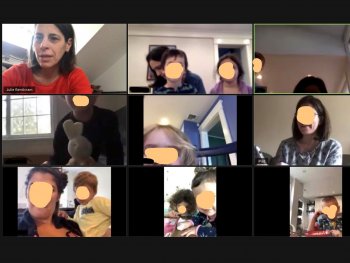Jewish Early Childhood Centers Expand the Meaning of School-Home Connections

It is crazy how fast the world can change in two weeks. Technology in the early childhood years was always a taboo subject and many educators would be able to recite a myriad of screen time warnings such as the one set forth by the World Health Organization advocating for limited or no screen time for children under 5.
Now, however, because of the coronavirus pandemic, using technology with young learners is the only thing my colleagues in the field of early childhood and family engagement can talk about.
Educators are seeing video and live feed options through an entirely new lens; a lens opening the door for them to offer stability, community, routines, rituals, and the continued developmental growth opportunities that their students need right now.
Their new stance: if children are likely to have more screen time at home during quarantine and social distancing practices, then it might as well be the school community that breaks through the virtual walls and comes into homes, at least for 20 minutes or so a day.
Here are some interesting ways the Jewish early childhood community has reacted and adapted to a new definition of home/school connection over the past two weeks:
Early Childhood Live. The boldest response yet has been from early adopters who have put together some type of live class experience. "Morning meetings" seem to be a big hit as teachers seek to offer their parents a predictable moment each day and a group connection to their students. Most are limiting these experiences to less than 20 minutes.
Julie BenAvram, working from home, engages her class through Zoom on behalf of Westchester Jewish Center in Mamaroneck, N.Y. Her primary goal is to keep the children feeling connected, seen, and appreciated on a daily basis.

Temple Beth Shalom in Hastings-On-Hudson, N.Y. added their online offerings to their website making it very easy for parents to find and navigate. Their model offers a whole school Storytime in the morning, 30-minute class-by-class sessions before lunch, and then a school-wide Shabbat on Fridays.
Luria Academy in Brooklyn, N.Y. launched a new “Luria at Home” Google Site, offering parents an interactive school calendar that includes Zoom links for each activity. Their program content includes bedtime stories, links to adult webinars offered by the Jewish community and the school faculty, and tutorials for students and parents on how to access and use the new tools being rolled out.
Jamie Schneider Schwartz, Early Childhood Director, Westchester Day School in Mamaroneck, N.Y. put together a whole-school schedule. This model engages all students together throughout the day rather than a class-by-class model. Teachers are taking turns leading live school sessions and help co-create the schedule on a shared Google document.
Mitzvot and Middot Meetups for 4 and 5-year-olds and their caregivers are being offered daily by Rabbi Jonah Rank, part-time Director of the Shule School, Kehilat HaNahar, in New Hope, Pa. Rabbi Rank anticipates classes to run for 5-10 minutes but is open to it running longer "if it goes really well". The class is open to anyone who wants to participate and will begin each day at 10:30 AM ET (7:30 AM PT). The focus will be on Mitzvot ("rules that connect us") and Middot ("values"). "We'll sing, we'll share, we'll say hi, we'll make friends, and we'll learn how to transform Torah into action together", says Rabbi Rank, who is also a musician, writer, and parent.
Teacher's Voices:
- “This morning I invited the children to join my teaching partner Sarah and me on Zoom for a virtual morning meeting. We sang the Good Morning song, then everyone shared which room they were in in their home and one feature of the room. We finished with singing the goodbye song. It wasn’t much but it meant a lot to the families.” – Julie BenAvram / 3s Teacher at Westchester Jewish Center, Mamaroneck, N.Y.
- “We keep our circle time the same. The child of the day is spotlighted on the Zoom lesson and leads the group. We do scavenger hunts and show and tell.” – Mickey ‘Blechner’ Nyer / ELC Teacher at SAR, NYC
- “We are doing storytime via Zoom (staff is rotating) Monday, Tuesday and Thursday at 10:00 am. Friday morning our clergy is doing a Shabbat sing-along. Wednesday is class get-togethers. Teachers will Zoom with their whole classes for about 20-30 minutes. Each class has its own time.” – Jennie Schacher-Rubin / Director Early Childhood at Temple B’nai Or, Morristown, N.J.
Teachers On Video. Schools that are less comfortable adopting live sessions are coming to the rescue with video recordings of storytimes, music class, art, and yoga time led by their teachers and shared through Facebook or Instagram, Vimeo, or their schools’ parent communication portal such as Seesaw or Remini. While parents can easily find similar videos on the internet to fill their child’s time, these teacher recordings provide a welcomed personal connection for the children when social distancing is likely to have an impact on children’s behavior and social and emotional wellbeing. You can see an example here offered by Ellen Detrick who works at Temple Beth Shalom in Needham, Massachusetts.
Teacher Voices:
- “I don’t love being on camera, but emergency times call for throwing all non-health related caution to the wind.” – Ellen Dietrick / Temple Beth Shalom, Needham, Mass.
- “We are recording teachers reading books and our Cantor singing songs. And we’ll send home emails with ‘fun things to do with your kids’.” – Ellen Edelson Bortz / Temple Beth Ami Nursery School, Rockville, Md.
A Focus on At-Home Activities. Many educators are responding to the Coronavirus outbreak knowing parents are likely to be struggling to know what activities they can do at home or how to talk to their young children about the issue. To help support that dialog, some are creating short online storybooks that can be read with children about the change that they are experiencing in their lives. This example comes from Meredith Polsky and Stephanie Slater from Temple Beth Am Nursery School at Adas Israel Congregation in Washington, D.C. Other schools are sharing links to high-quality learning resources for children such as The Jewish Education Project’s new Pinterest Resource Page Including Activities for Parents; PJ Library’s Resources for Quarantined Families; and Honey Cake Magazine’s temporarily made Free Printable Activities for Children 2-6 and bulk discounts to their print magazine just in time for Passover.
Teachers are Learning New Skills on the Fly. Many educators are having to learn how to use new digital tools in a very short amount of time and for a different purpose. It might be easy to jump on a video call with colleagues or Facetime with your family while on vacation, but preparing to be on Zoom with your class of 10-20 3-year-olds is something entirely different.
Educators are struggling to learn new classroom management skills swiftly so they can support children fully, create a valued sense of community, and let their unique voices come through. To help educators learn these tools they are turning to their professional networks and participating in technology tutorials such as Responding to Coronavirus Through Digital Engagement a webinar The Jewish Education Project offered and that's now recorded. Related to this webinar is the accompanying Digital Engagement Webinar FAQ and the resources organized on Padlet, which beautifully models a lesser-known tool.
It’s an Emotional Time for Many Educators. During this time of flux, educators are reflecting on very personal and significant ideas about early childhood learning and trying to understand better how to make difficult decisions about engagement through or supported by digital platforms. Above all, they want to meet the needs of their families and they want to retain the connections they have with their students.
Teacher Voices:
- “As I was reflecting on these fabulous educators [through an online forum] I realized that beyond giving the children educational/academic experiences, these teachers were providing their students a sense of community, continuity and care in incredibly tumultuous times. I was charged and motivated!” - Julie BenAvram / Westchester Jewish Center, Mamaroneck, N.Y.
- “We might start doing this next week, also with Zoom, which we haven’t used before. I am pretty nervous, but hopefully it will work out.” – Cindy Ghitis / Temple Beth Emet Early Childhood Center, Weston, Fla.
- “We are taking time on Monday and Tuesday to offer training and planning and will begin offering our parents online connections on Wednesday.”
Kol HaKavod to the Educators. Had the Coronavirus not made its appearance my colleagues and I would be running our annual Spring conferences, scheduled for March 17 & 19 – When We Create: Empowering Children’s Unique Voices Through The Arts - a precursor for developing ingenuity, personal expression, and divergent thinking in young children. Instead, Jewish educators across the country (teaching all ages of children) are modeling those very same characteristics by reacting swiftly, taking risks themselves, and expressing personal creativity during extremely unsettling times.
Shariee Calderone is a Senior Educational Consultant for Early Childhood and Family Engagement at The Jewish Education Project.